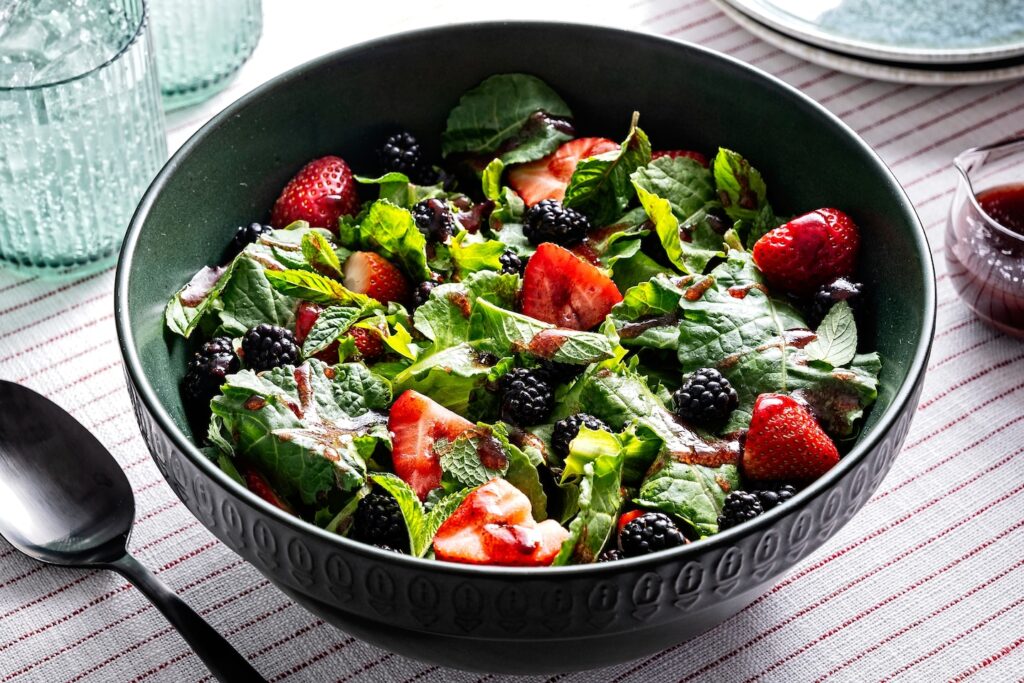On a recent school visit, I asked a group of fourth-graders gathered in the library, “Does anyone like to cook?” Nearly every hand went up.
Recipes are a valuable learning tool for young foodies, and you can use them to celebrate Juneteenth, teach its history, and highlight Black culture and joy.
Juneteenth became our newest federal holiday in 2021, 156 years after Union General Gordon Granger and his troops arrived in Galveston, Texas, on June 19, 1865, to call for the emancipation of enslaved Texans. Many 21st-century Americans, including Black Americans, are unaware of the holiday, and Juneteenth has not been widely incorporated into school curricula.
Get the recipe: Strawberry and Kale Salad with Blackberry Dressing
I wrote The Juneteenth Cookbook: Recipes and Activities for Kids and Families to Celebrate with chef Taffy Elrod to help tell the story of this holiday to the next generation. Luckily, our book isn’t the only one. Recent Juneteenth children’s books include board books like Celebrate Juneteenth by Tonya Avari and picture books like Opal Lee and What Freedom Means by Alice Faye Duncan about Juneteenth grandmothers and They Made Me for Freedom by Tonya Duncan Ellis about Emancipation Park in Houston. Having grown up in Buffalo, home to one of the largest ongoing Juneteenth celebrations in the world, I wrote The Story of Juneteenth: Celebrating the End of Slavery in the United States in 2022 as a resource for upper grades to tell the story of how the holiday began and has evolved.
I write to offer kids a window into the lives of others. But I strive to offer black kids, especially, a mirror of their own. They need validation while exploring the roots of this holiday in a way that blends familiar barbecue dishes and ingredients with historical and cultural context. We want kids to be exposed to the timeless themes of Juneteenth, from traditions to connections with the diaspora to barbecue culture to the complexities of the holiday itself.
For some of us, nostalgia is rooted in memories of cooking and eating together — the essence of “comfort food.” But the origins of Juneteenth are not, and shouldn't be, a feel-good topic. They are rooted in the long-term end of American slavery, one of the gravest human rights crises in world history.
Some adults try to avoid Juneteenth and other difficult topics with their kids because they don't know what to talk about. Admittedly, kids' questions are difficult. Parents, please be patient. We don't know everything. But we can encourage dialogue and learn alongside our kids using one of the many resources available today.
Listen to their inquisitiveness and keep the conversation focused on why we eat what we eat. Recipes like Red Lemonade and Red Velvet Ice Cream Sandwiches will help you discuss the Juneteenth tradition of eating red foods. Theories about its origins are linked to bloodshed during slavery, the novelty of red food during early Juneteenth, and the color produced by boiling the iconic West African kola nut.
Juneteenth celebrates the emancipation of slaves in the United States, but it would be disingenuous to ignore the global impact of slavery and the African origins of enslaved people and the foods we now call American cuisine. Our hibiscus-infused “Jubilee Tea” pays homage to the African flower that is now widely grown in the Caribbean and Latin America, where most enslaved Africans were transported.
Part of Juneteenth education is keeping alive Black barbecue culture and the art of barbecue cooking, which was developed by Native Americans and adopted by enslaved Africans. The earliest Jubilee Days (the name “Juneteenth” was adopted in the late 19th century as a combination of “June” and “19th”) were gatherings centered around a barbecue, people dressed in their best clothes, and enjoyed music and games. Children were part of the preparation process by helping with barbecue garnishes, and could leave the grilling to adults. Today, the music may be different, but the essence of the barbecue remains the same, even the million-dollar question: “Who made the potato salad?”
But just like being black, it's important to remember that black Americans' perceptions of holidays are not monolithic. Celebrating a holiday founded and maintained by formerly enslaved ancestors and their descendants is powerful for some. For others, the sheer injustice of the 900-day delay in emancipation that led to Juneteenth is like rubbing salt in the wound.
And so a strawberry and kale salad with blackberry dressing was born, a salad that visually embraces the red, black, and green colors of Black emancipation but whose taste is a mix of sweet, fresh, sour, and bitter, akin to the cacophony of Black people's views of the holiday itself.
We hope you enjoy the flavors that will spark conversations, create memories, learn together, and tell holiday stories born of incredible resilience across generations. It might be an uncomfortable place, but that's OK. That's where food comes into its own. Stop for a bite when you need to.
Get the recipe: Strawberry and Kale Salad with Blackberry Dressing



